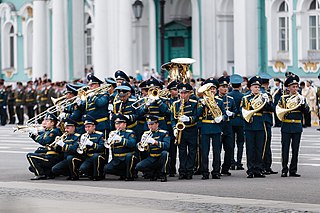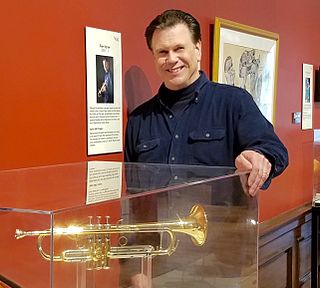Related Research Articles

The cornet is a brass instrument similar to the trumpet but distinguished from it by its conical bore, more compact shape, and mellower tone quality. The most common cornet is a transposing instrument in B♭. There is also a soprano cornet in E♭ and cornets in A and C. All are unrelated to the Renaissance and early Baroque cornett.

A musical ensemble, also known as a music group or musical group, is a group of people who perform instrumental and/or vocal music, with the ensemble typically known by a distinct name. Some music ensembles consist solely of instrumentalists, such as the jazz quartet or the orchestra. Other music ensembles consist solely of singers, such as choirs and doo wop groups. In both popular music and classical music, there are ensembles in which both instrumentalists and singers perform, such as the rock band or the Baroque chamber group for basso continuo and one or more singers. In classical music, trios or quartets either blend the sounds of musical instrument families or group together instruments from the same instrument family, such as string ensembles or wind ensembles. Some ensembles blend the sounds of a variety of instrument families, such as the orchestra, which uses a string section, brass instruments, woodwinds and percussion instruments, or the concert band, which uses brass, woodwinds and percussion.

The tenor horn is a brass instrument in the saxhorn family and is usually pitched in E♭. It has a bore that is mostly conical, like the flugelhorn and euphonium, and normally uses a deep, cornet-like mouthpiece.

A concert band, also called a wind band, wind ensemble, wind symphony, wind orchestra, symphonic band, the symphonic winds, or symphonic wind ensemble, is a performing ensemble consisting of members of the woodwind, brass, and percussion families of instruments, and occasionally including the harp, double bass, or bass guitar. On rare occasions, additional, non-traditional instruments may be added to such ensembles such as piano, synthesizer, or electric guitar.
In Britain, a brass band is a musical ensemble comprising a standardized range of brass and percussion instruments. The modern form of the brass band in the United Kingdom dates back to the 19th century, with a vibrant tradition of competition based around communities and local industry, with colliery bands being particularly notable. The Stalybridge Old Band was formed in 1809 and was perhaps the first civilian brass band in the world.

A brass quintet is a five-piece musical ensemble composed of brass instruments. The instrumentation for a brass quintet typically includes two trumpets or cornets, one French horn, one trombone or euphonium/baritone horn, and one tuba or bass trombone. Musicians in a brass quintet may often play multiple instruments. Trumpet players for instance may double on piccolo trumpets and flugelhorns. There can be variation in instrumentation depending on the type of quintet. In some quintets, the horn is replaced by an additional trombone. Euphonium may also be substituted for the trombone part. While the tuba is considered a standard, the range and style of many pieces lend themselves to being played with bass trombone as the lowest-pitched instrument. Additionally, some pieces call for the use of percussion instruments, particularly the snare drum, tambourine, or timpani.

The River City Brass Band is a modified British-style brass band based in Pittsburgh, Pennsylvania. The twenty-eight-piece ensemble tours extensively throughout the United States and performs more than thirty-five concerts each year as part of its community concert series in Western Pennsylvania.
The Grimethorpe Colliery Band is a brass band, based in Grimethorpe, South Yorkshire, England. It was formed in 1917, as a leisure activity for the workers at the colliery, by members of the disbanded Cudworth Colliery Band. Along with the Black Dyke Mills Band, the band became the first to perform at the Proms. Grimethorpe Band achieved worldwide fame after appearing in the film Brassed Off.
Douglas Yeo is an American bass trombonist who played in the Boston Symphony Orchestra from 1985 to 2012, where he held the John Moors Cabot Bass Trombone Chair. He was also on the faculty of the New England Conservatory. In 2012 he retired from the BSO and accepted a position as professor of trombone at the Arizona State University School of Music, a position he held until 2016. In 2019, he was appointed to the faculty of Wheaton College (Illinois).

A brass band is a musical ensemble generally consisting entirely of brass instruments, most often with a percussion section. Ensembles that include brass and woodwind instruments can in certain traditions also be termed brass bands, but may be more correctly termed military bands, concert bands, or "brass and reed" bands.
The First Suite in E♭ for Military Band, Op. 28, No. 1, by the British composer Gustav Holst is considered one of the cornerstone masterworks in the concert band repertoire. Officially premiered in 1920 at the Royal Military School of Music, the manuscript was originally completed in 1909. Along with the subsequent Second Suite in F for Military Band, written in 1911 and premiered in 1922, the First Suite convinced many other prominent composers that serious music could be written specifically for band.

The brass section of the orchestra, concert band, and jazz ensemble consist of brass instruments, and is one of the main sections in all three ensembles. The British-style brass band contains only brass and percussion instruments.
The Georgia Brass Band was conceived by co-founders Joe Johnson and Christopher Priest in the spring of 1999. It is a traditional British brass band. The band performed its first concert in September of that year and has maintained a very busy schedule ever since. Band members are selected by audition or invitation and include some of the finest musicians in the Atlanta area.

Roger O'Neal Ingram is a jazz trumpeter, educator, author, and instrument designer. He played trumpet for the orchestras of Maynard Ferguson, Woody Herman, Wynton Marsalis, Ray Charles, and Harry Connick Jr.

A fanfare band, fanfare corps, fanfare battery, fanfare team, horn and drum corps, bugle band, drum and bugle corps, or trumpet and drum band is a military or civilian musical ensemble composed of percussion instruments, bugles, natural horns and natural trumpets. Fanfare bands are the descendants of the old medieval trumpet and drum teams that sounded fanfares on important occasions and are related to drum and bugle corps internationally.

Ernst Albert Couturier was best known as a cornet player who toured as a "virtuoso" performer on the concert programs of bands of the day. He promoted the Holton Band Instrument Company for a decade in that capacity before applying his own unique inventions to the production of his own line of brass band instruments between 1918 and 1923.

A fanfare orchestra is a type of brass band consisting of the entire saxophone family, trumpets, trombones, euphoniums, baritone horns, flugelhorns and alto/tenor- or F-horns, as well as percussion. They are seldom seen outside of Europe, with a high concentration of these bands in Belgium and the Netherlands, many of them civil bands with a few Dutch bands also serving the Armed forces of the Netherlands and its veterans.

River Brass was established in 1991 as a community band. Over the years, the band has developed into a high-caliber competing band. The group took its original name from the ox bow bend of the Ohio River that separates the cities of Evansville, Indiana and Henderson, Kentucky. As the band gained more members from across the tri-state region, the geographical footprint was well beyond the original "bend in the river", so the name was changed in the fall of 2015 to "River Brass" to include members who live near both the Ohio River and Wabash River. The band currently rehearses at Epworth United Methodist Church in Newburgh, IN. Its current conductor is Dr. Pat Stuckemeyer.
The Smoky Mountain Brass Band (SMBB) is a British-style brass band based in Asheville, North Carolina. The band, which consists of both professional and non-professional musicians, performs several concerts each year all throughout western North Carolina. The current Director of Music of the Smoky Mountain Brass Band is Casey Coppenbarger.
Peter Aloysius Meechan is a British composer, conductor, and music publisher.
References
- ↑ Pesanne (October 20, 2019). "The St. Louis Brass Band presents the inaugural Gateway British Brass Band Festival". St. Louis Post-Dispatch . Retrieved June 18, 2021.
- ↑ Hines, Holly (October 25, 2014). "Remembering Hoover's funeral, 50 years later". Iowa City Press-Citizen . Retrieved June 18, 2021.
- ↑ "Eastern Iowa Brass Band". The Waterloo-Cedar Falls Courier . July 4, 2013. Retrieved June 18, 2021.
- ↑ Forrest, Myka (July 29, 2011). "Eastern Iowa Brass Band celebrates anniversary with a free concert". The Gazette . Retrieved June 18, 2021.